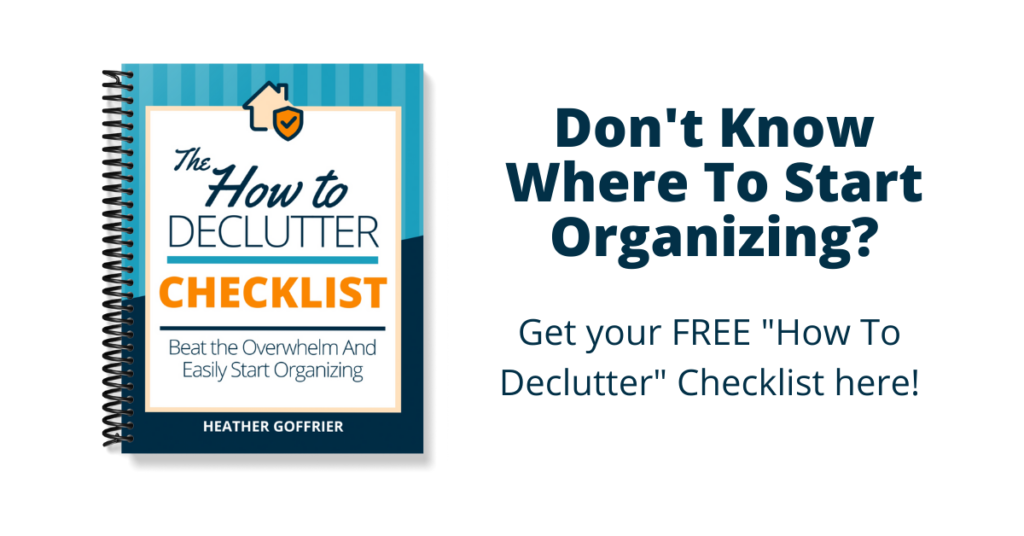Starting a newborn sleep schedule can be daunting and confusing if you don’t have the right plan. Learn these 9 hacks so your routine starts off smoothly.
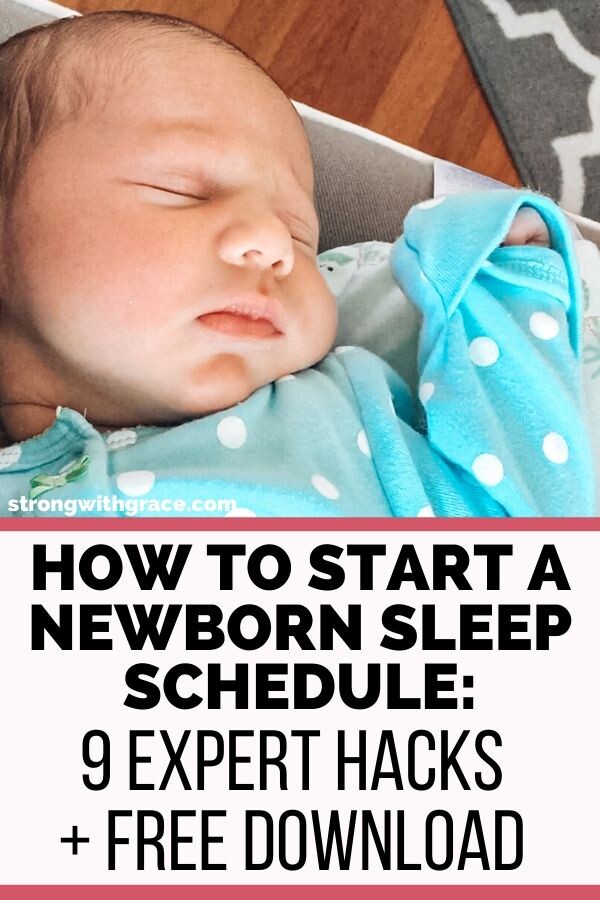
With Daddy on deployment, Mommy recovering from a c-section, and two silly-pants older sisters, my youngest daughter was born into a lot of chaos.
Her sisters constantly tried to hold her, coo at her, and smother her with gooey kisses while I laid in bed, wincing from the pain of my incision and sleep-deprived from round-the-clock feedings.
Amazingly, the baby slept through it all in a rock-n-play in the corner of our combo living/dining room, despite the Paw-Patrol shows blaring and the one-year-old shrieking with delight at her tower of blocks.
I regularly had to keep said one-year-old from bonking and poking baby sis in the face when curiosity brought her toddling back around the room to baby’s corner.
Table of Contents
Finding Our New Normal With A Newborn Sleep Schedule
All the chaos meant our newborn sleep schedule started out even more gradually and gently as we found our new normal in a not-so-normal situation.
She was also born almost three weeks early, so she was much sleepier than my other girls had been in the beginning.
In fact, on the day she was born, she slept for 6 or 7 hours in a row and I kept asking the nurses if she was ok. They tell you to feed baby every two hours, so I got super worried about her missing 3+ meals.
The nurses reassured me that she was fine.
I could tell she was, but since my first two had done so well with a sleep routine, I was a bit over-excited to get started. I soon realized (and remembered) that everything is so crazy in the beginning that there really isn’t a schedule, and that’s totally ok for a few days.
Baby girl was adjusting, I was getting to know her and also healing, and the older girls had adjustments of their own.
RELATED: 21 TOP BABY SLEEPING PRODUCTS TO KEEP BABY SNUG, SAFE AND ASLEEP ALL NIGHT
Parental Guidance Recommended For Newborns
I’m sure that every new mom feels a bit of that craziness. I felt it still after my third child, and it’s just part of the deal with a newborn.
But despite the chaos, it’s important for parents to play a huge role in helping baby adjust to the world around them.
Babies have no idea what’s happening, after all. And though they have God-given natural instincts (so amazing to watch!), parents can help their babies get a handle on life as they now know it.
From day time to night time, sleeping and eating, and all the other new experiences, using a routine helps babies adjust in a gentle, predictable way.
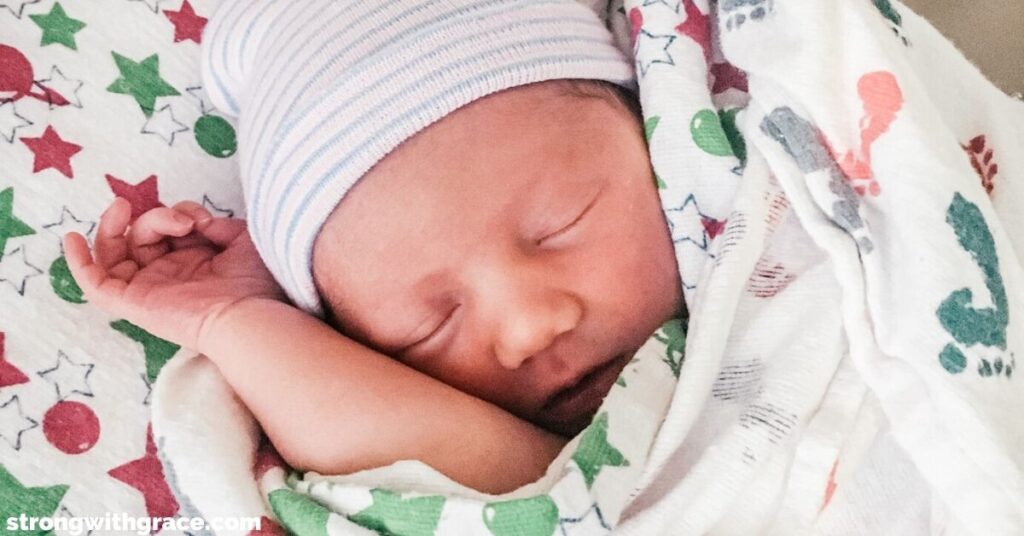
The Scientific Benefits Of Good Sleep
If you want to start a newborn sleep schedule, I’m excited for you!
Using a gentle, consistent routine helped my kids sleep through the night (6-8 hours) by 8 weeks. They all slept from 10-12 hours starting at weeks 10- 16, depending on the child.
Having spoken to many moms who’ve said they didn’t get a full night’s sleep in over a YEAR (ok that really freaked me out!), I am so grateful for the benefits of a sleep schedule.
I’m sorry but when someone told me there’s a way to actually get some sleep with a newborn, I opted in for that immediately.
Especially because I know sleep is SO vital to babies’ brain development and mom’s healing (and sanity).
According to Alice Callahan of Scienceofmom.com, “Sleep has been shown to be important for maturation of infants’ brains and consolidation of their memories. Several studies have shown that babies with more efficient nighttime sleep (greater percentage of time spent asleep during the night) had higher cognitive scores.”
All that to say, I put a lot of intentional time into creating and maintaining a gentle– not rigid– schedule that allowed my babies to learn to fall asleep independently, sleep for longer periods at night, and wake up happy and well-rested.
And a newborn sleep schedule can work for you too.
9 Expert Hacks For Starting A Newborn Sleep Schedule
1- Get Mentally Ready And Have A Plan
I’ve heard a lot of moms say they decided to start sleep training, so one night they just put their baby down in the crib to sleep and stepped outside the room.
Of course, baby started wailing right away.
Then the moms were confused, anxious and stuck wondering what to do next. It was so unsettling having no idea what they did wrong, and whether or not they should go in now… in 5 minutes… or try cry it out?
Instead of getting stuck in that position, research your plan before starting a newborn sleep schedule.
2- Be Consistent
Once you pick a plan, stick to it.
You can be flexible, but if you flip back and forth between having a schedule and not having a schedule, you’ll be like a pre-schooler picking out ice cream flavors.
Strawberry. No, vanilla. Actually, I want blue bubble gum. Noooo, I wanted strawberryyyyyyyyy!!!!
You’re going to drive yourself and your baby nuts.
Worse, you won’t see many gains in the sleep department because your baby will be as confused as you are. It’s ok to deviate from your plan at times as you adjust to your baby.
Go with your mom gut if you have to feed and it’s only been an hour, or if they sleep right through when you thought you’d try some tummy time.
Just try to get back on track so the majority of the time, you’re staying consistent. Babies thrive with consistency and routine.
3- Just Start
If you’re past the 3-week-old baby mark, it’s not too late to start.
Begin slowly and plan out your days to see where you might be able to shift things into a routine.
It make take a few days, or a couple weeks in some cases, for baby to fully adjust, but you’ll see the benefits of an infant sleep routine soon.
Begin slowly and plan out your days to see where you might be able to shift things into a routine. It make take a few days, or a couple weeks in some cases, for baby to fully adjust, but you'll see the benefits of an infant sleep… Share on X4- Pay Attention To Your Baby’s Cues
Your baby has a voice.
They will communicate with you the only ways they can, which is through crying and body language, called newborn sleep cues.
It may come as a surprise that your baby’s cries aren’t all the same. If you pay attention, you will soon learn that one cry means “I’m starving,” one means “I’m tired,” and another means, “I’m hurt,” to name a few.
Babies are different.
Your baby may show different signs of tiredness or hunger than your friends’ children. For example, signals such as rubbing eyes or ears, yawning, or turning their face away are all sleep cues.
Some babies may show many of these while others only show one.
Learn as much as you can about your baby’s unique voice and cues– it will help you meet their needs SO much more quickly!
RELATED: EVERY MOM WHOSE BABY NAPS WELL KNOWS THESE 15 NEWBORN SLEEP CUES
Learn as much as you can about your baby's unique voice and cues– it will help you meet their needs SO much more quickly! #newmom #babyroutine Share on X5- Lay Baby Down Awake
It’s important to help babies learn to fall asleep on their own. This is a gradual process and not a rigid demand.
During the first few weeks baby is home, holding and snuggling them when they’re asleep won’t derail your routine. But after about three weeks, babies start to perk up and become more sensitive to their environments.
That doesn’t mean that if you allow your child to sleep on you after three weeks that you’re “spoiling” them. They need lots of snuggles.
But if you want them to be able to sleep through the night at an early age, you’ll want to start helping them learn that they can fall asleep without being next to a warm body.
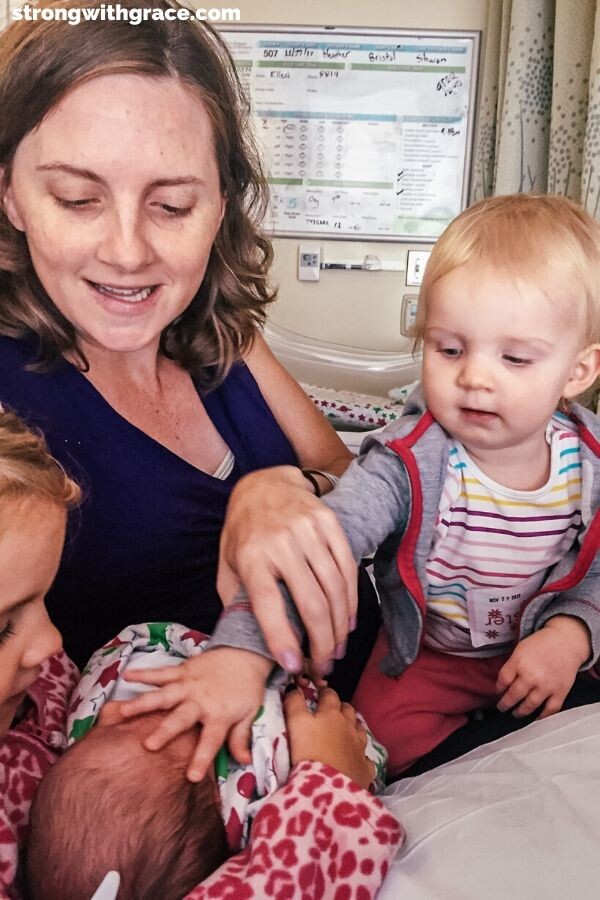
How To Lay A Baby Down Awake
Putting a baby down awake doesn’t mean putting them down wide awake. It means watching for sleepy cues (more on that in the next point), then doing your bedtime or nap routine and putting them down just before they fall asleep.
Putting a baby down awake doesn't mean putting them down wide awake. It means putting them down just before they fall asleep. #babysleep #newmom Share on XWhen you get them to the place where they are drowsy and giving you that far-off-stare, or just closing their eyes, that’s when you put them down.
They are still awake but on the brink of sleep.
They may startle and fuss, and then you can pick them back up until they calm down. Then put them down again.
It may take a few times of up and down, but soon they will conk out.
We hope you enjoy the products we recommend! This post contains affiliate links. Please see our full disclosure policy here.
***If you are trying this when your baby is older than a few weeks, you may need to try the pick-up and put-down strategy (a highlight of my favorite sleep book, Secrets of the Baby Whisperer) over the stretch of a couple days.
Solving Newborn Sleep Schedule Issues:
6- Don’t Start At Night
One huge mistake I see new moms making is to start a sleep schedule at night, before making any adjustments to their day.
An easy bedtime experience starts by laying the groundwork throughout each day with a gentle, consistent routine.
One huge mistake I see new moms making is to start a sleep schedule at night, before making any adjustments to their day.An easy bedtime experience starts by laying the groundwork throughout each day with a gentle, consistent… Share on XThat way, when it comes to bedtime, your baby is already primed for another nap… except this time it’s an elongated night of sleep.
It takes time for baby to adjust to a routine, but as she does, you’ll start to notice her night feeds getting further and further apart.
7- Discover Why Baby Is Unhappy
Babies cry to communicate. If we feed them every time they cry, we may be missing what they are trying to say.
Newborns typically eat every two hours or so, though they could be hungry earlier, or go a bit longer between meals if they’ve been napping. If you just fed them, go through this list to see what else could be bothering them before trying to feed them again:
Check to see if baby is:
- Too hot
- Too cold
- Wet diaper
- Tummy ache or gas
- Something stuck on them like a piece of mom’s hair (this drove my oldest nuts once)
- Finger or toe stuck inside clothes
- Needs to burp
- Overtired
- Swaddle came loose
- Needs pacifier
- Health issues such as a temperature, cough or a runny nose.
You may be able to solve your baby’s issue without feeding them so soon after a previous feed. This will help you get them on a more regular eating routine. It will also give you a break from constantly nursing, whether day or night.
Of course, if your baby is hungry, feed him or her!
Trust your mom instincts, and if you feel there’s a serious problem, don’t hesitate to call their pediatrician or dial 9-1-1.
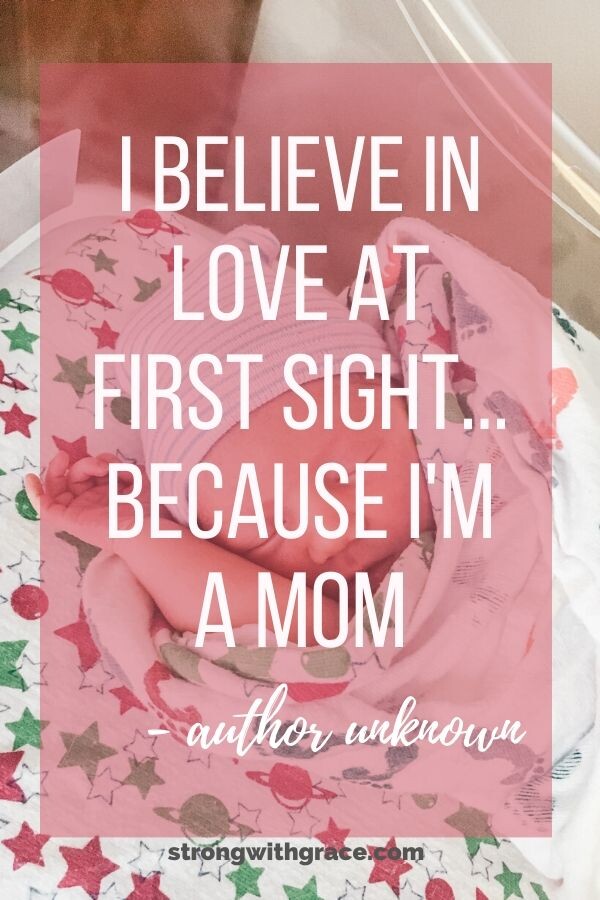
8- Capitalize On The Sucking Reflex And Use A Pacifier
Many new moms wonder whether to introduce a pacifier when baby is first born because they don’t want to confuse the baby.
However, I found pacifiers to be super helpful and to not cause any confusion at all.
Babies have a natural sucking reflex from 0-3 months, and many babies love the comfort of pacifier. It helps them drift off without having to be attached to mom.
Babies have a natural sucking reflex from 0-3 months, and many babies love the comfort of pacifier. It helps them drift off without having to be attached to mom. #newbornsleep #newmom Share on XWhen it’s time for bed or nap, I would swaddle my girls up, pop in a pacifier, and put them down awake (but drowsy). They usually went right to sleep, especially after we’d been on a routine for a few days/weeks.
You might have to pop the paci back in a few times as they fall asleep, but it’s worth a bit of effort up front to help them learn to nod off without a warm body next to them all the time.
9- Limit The Time Between Each Feed
Sleeping too long during the day leads to shorter “naps” during the night. Be sure to wake baby before they’ve taken too long of a nap.
This will really help to lengthen night sleep!
Don’t let your baby go more than about 3 hours between feeds during the day in the first month, or 4 hours after 4 weeks of age. This will help them lengthen out night sleep like nobody’s business!
INFANT SLEEP SCHEDULE SUPPLIES LIST:
It’s time to start feeling way more rested, don’t you think? You don’t need many supplies to get started. In fact, you probably already have everything on this list
- Swaddle blanket
- Pacifier
- Clock ( I used my phone timer)
- Notepad or app (I recommend the app BabyMama for tracking feeds)
- A Plan
The “Newborn Sleep” Series
This is the sixth post in my “Newborn Sleep” Series. Be sure to check out the other posts in the series and stay tuned for new additions!
- When Is The Best Time To Start An Infant Sleep Schedule?
- 5 Reasons To Start A Baby Sleep Schedule By 3 Weeks Old
- 7 Newborn Baby Schedule Mistakes To Avoid
- 17 Insanely Powerful Tips For Getting Newborn To Sleep At Night
- Baby Never Sleeps? You Might Be Missing These 15 Newborn Sleep Cues
- How To Start A Newborn Sleep Schedule: 9 Expert Hacks +Free Download (This Post)
- 13 Major Problems You May Face When NOT Using A Baby Sleep Routine
- Does It Work? How I Used A Newborn Sleep Routine With All My Girls
BABY STUFF EVERYWHERE? GRAB MY FREE “HOW TO DECLUTTER” CHECKLIST FOR MOMS!

